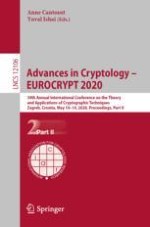
2020 | OriginalPaper | Buchkapitel
Separate Your Domains: NIST PQC KEMs, Oracle Cloning and Read-Only Indifferentiability
verfasst von : Mihir Bellare, Hannah Davis, Felix Günther
Erschienen in: Advances in Cryptology – EUROCRYPT 2020
Aktivieren Sie unsere intelligente Suche, um passende Fachinhalte oder Patente zu finden.
Wählen Sie Textabschnitte aus um mit Künstlicher Intelligenz passenden Patente zu finden. powered by
Markieren Sie Textabschnitte, um KI-gestützt weitere passende Inhalte zu finden. powered by